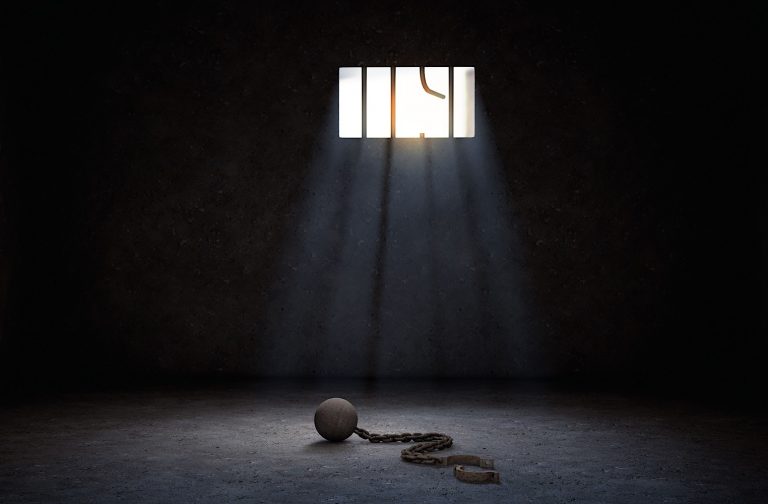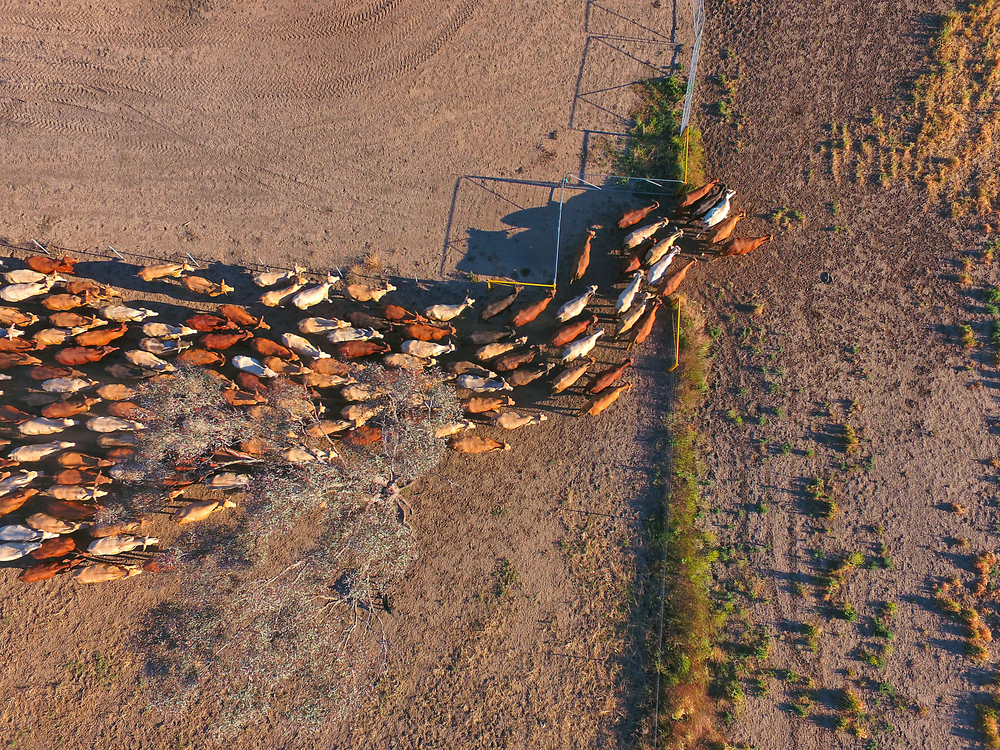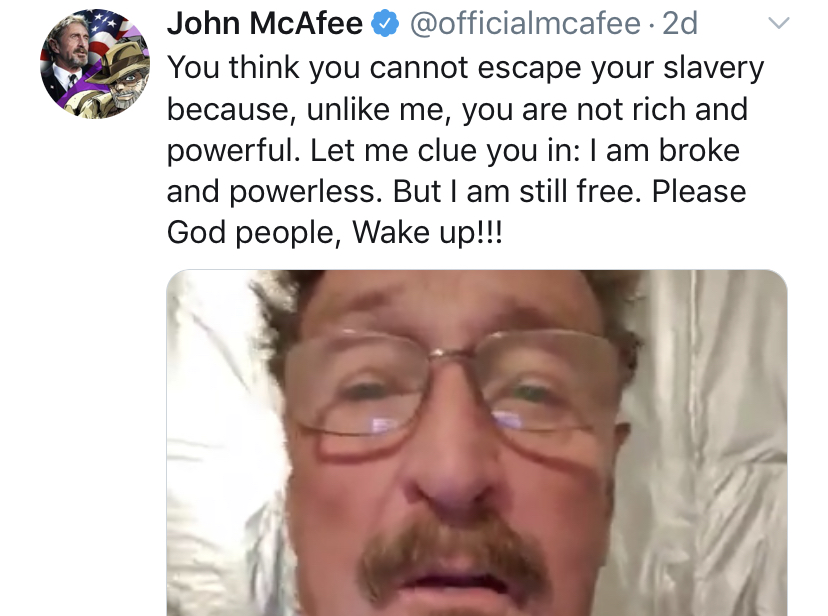The Modern Era of Free Range Slaves: How Bitcoin Breaks the Mold
Publikováno: 3.8.2019
 In a string of recent Tweets, 2020 Libertarian presidential candidate and fugitive from the law John McAfee has been talking about slavery. Urging people to “wake up” and assuring them that neither compliance with the status quo, nor stacks of riches, can set them free. Indeed, when the current state of the world is examined […]
In a string of recent Tweets, 2020 Libertarian presidential candidate and fugitive from the law John McAfee has been talking about slavery. Urging people to “wake up” and assuring them that neither compliance with the status quo, nor stacks of riches, can set them free. Indeed, when the current state of the world is examined […]
The post The Modern Era of Free Range Slaves: How Bitcoin Breaks the Mold appeared first on Bitcoin News.

In a string of recent Tweets, 2020 Libertarian presidential candidate and fugitive from the law John McAfee has been talking about slavery. Urging people to “wake up” and assuring them that neither compliance with the status quo, nor stacks of riches, can set them free. Indeed, when the current state of the world is examined closely under an economic lens, there is no other rational conclusion save that humanity currently inhabits a gigantic, fiat money plantation, and that the slaveholders are violent and irrevocably unreasonable.
Also Read: Bitcoin Cash 2-Year Anniversary: Celebrating Protocol Development and Achievements
You Are a Slave
Yes, you are a slave. No, that’s not hyperbole. Before launching into this, though, it’s important to define terms. A generally agreeable definition runs like this one, put forth by UNESCO:
As slavery seems to take new forms, it is still, nevertheless, identified by an element of ownership or control over another’s life, coercion and the restriction of movement and by the fact that someone is not free to leave or to change an employer.
In essence, to be a slave is to have no autonomy or freedom concerning one’s body with regard to other human beings. That’s just to say, if you’re not a slave, you can do what you want within the bounds of property, and nobody has a right to force you to be somewhere, or to work for them.
The historic plantation slavery of the southern United States is well-known for its visible, horrific evils wrought on innocent human beings treated as property. Blatant examples of slavery also continue in many places today, in the form of direct “ownership,” human trafficking, sex slavery, and suchlike. But there’s still a form that is so blatant as to be ubiquitous, yet which most do not even protest, let alone recognize: fiat slavery.
In a recent live video uploaded to his Twitter account, maverick anti-politician John McAfee laments: “You think you’re not slaves but you are. The nine-to-five existence of your current lives is structured by the American industrial corporate complex, complicit with our government. You need to free yourselves from this.”
He goes on to state: “This is not what life is. Life is a great mystery. A glorious, unbelievably mysterious, beautiful existence if you are free from those who control you.”
An actual abolitionist from the plantation slavery era in the United States, political philosopher, essayist, and individualist anarchist Lysander Spooner eloquently elaborated:
While some balk at the idea of taxation and fiat money being a form of slavery, there really is no other rational conclusion. According to former IRS agent Sherry Peel Jackson in one of her many compelling speeches, it’s true, and knowledge of economics bears it out:
And let me tell you, that as a black woman I am keenly aware of the history of slavery. But do you understand that we are all slaves to this system? Do you understand that the media and Hollywood play a part keeping the American people so fixated [onmovies and TV]…that we don’t take time to read the Creature from Jekyll Island, study the Internal Revenue Code and learn the Constitution?
What Makes You A Slave?
In civilized market transactions, the buyer chooses the products or services they’d like to purchase, and the quantity, freely. Common sense. Nobody would frequent a pizza shop, for example, where the workers and owner forced people to buy pizzas under threat of violence. This would not only be absurd – it would be completely immoral.
With government and its fiat (lit. “by decree”) money, though, you don’t have a choice. The services and products—and their quantities—are chosen for you in advance, and you must buy, and work to pay via taxes, or go to jail. If you don’t like the quality of police protection offered to your community, that’s too bad. You must pay for it. If you don’t like any of the politicians running for office to rule your life, that’s too bad. You still have to work and pay for the winner’s policies to be implemented. If you don’t pay, you’ll go to jail. If you try to run away, you’ll almost always be caught. Maybe killed. If you wish to leave the plantation, there’s a fee for that, and your request may be denied. Just to be 100%, crystal clear: your request to move your own body geographically elsewhere may be denied. So, in the end, who owns you? It certainly isn’t you, by the looks of things.
Free Range Tax Cattle
Before 1861, there was no such thing as an “income tax” in America. In fact, the IRS was formed around the same time to collect the nation’s very first income taxes as a “temporary” measure to pay for the Civil War. Of course, “temporary” would turn into perpetual, and the many-tentacled monster of centralized state banking would grow in grotesque, rapid fashion, leading to the current situation. In 1895, the U.S. Supreme Court struck down the income tax as unconstitutional, but it would be later revived as a permanent fixture in 1913, the same year the Federal Reserve was created.
Currency competition was also historically permitted more or less, prior to this time. Until the National Bank Act of 1863, communities, churches, railroads, and virtually anyone could issue their own paper money backed by whatever they saw fit. These days, unless one’s currency is approved by the government, forget about it. This is why the whole issue of Bitcoin and currencies like Facebook’s proposed Libra are causing so much commotion. Never mind that the Fed has just slashed interest rates once again, on July 31. This for the first time since the financial crisis of 2008. The money forced on everyone continues to be systematically devalued and debased. No matter. Use it, or else.
That’s the situation. Forced to work to pay for things for someone else. No safe alternative. Cannot leave. If you leave, you’ll have to pay for your freedom. If you try to run away, you’ll be caged, killed, or fined and returned to the plantation. This is, by definition, slavery.
Bitcoin Breaks the Mold
At the beginning of July the Dementia Society of America announced it would begin accepting Bitcoin and crypto donations:
Why crypto donations? For donors in the United States, the IRS has classified Bitcoin as property for tax purposes. When you donate Bitcoin…you don’t pay capital gains tax and can write off the donation. You can change lives, and honor the memory and legacy of a loved one, in a convenient and tax efficient way.
Even if these tax laws were changed, bitcoin would still have the ability to travel thousands of miles in an instant, for practically zero fees, which means its utility cannot be determined by a state or central bank. From Venezuelan aid to clothes in Canada, crypto’s ability to sustain secure, reliable, and fraud-resistant charity is remarkable.
What really frightens the slaveholder paradigm is the fact that when individual users—and not central banks or governments—hold the private keys to their money, the only way to control it is to attempt a desperate application of force. This has two effects:
- Proving that the money is indeed secure and valuable.
- Showing the state for what it is: a violent, inhumane, controlling force.
The Keys Must Be Used or the Lock Won’t Open
Bitcoin and crypto are tools that can help trapped humans enjoy a better quality of life and begin to break free from the slave cycle McAfee speaks of. They’ve already begun to do so, giving normal, everyday individuals who couldn’t compete in the status quo of fiat power, an unexpected chance to innovate and be judged by their own merits and the market, instead of an arbitrary set of illogical, violent rules. Perhaps that is why governments are supportive of blockchain in general, but stand against private currencies. That said, in and of themselves, these are not enough.
As McAfee details in his latest video, even if one has all the money (or bitcoin) in the world, without an understanding of the value of freedom, no one can break free.
What do you think about McAfee’s statements? Let us know in the comments section below.
OP-ed disclaimer: This is an Op-ed article. The opinions expressed in this article are the author’s own. Bitcoin.com is not responsible for or liable for any content, accuracy or quality within the Op-ed article. Readers should do their own due diligence before taking any actions related to the content. Bitcoin.com is not responsible, directly or indirectly, for any damage or loss caused or alleged to be caused by or in connection with the use of or reliance on any information in this Op-ed article.
Images courtesy of Shutterstock, Twitter, fair use.
You can now purchase Bitcoin without visiting a cryptocurrency exchange. Buy BTC and BCH directly from our trusted seller and, if you need a Bitcoin wallet to securely store it, you can download one from us here.
The post The Modern Era of Free Range Slaves: How Bitcoin Breaks the Mold appeared first on Bitcoin News.




